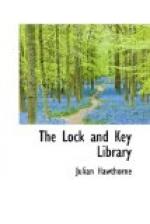On the day of which I am now writing—destined to be a memorable day in our calendar—the hounds meet at Farleigh Hall. Mrs. Fairbank and I are mounted on two of the best horses in my friend’s stables. We are quite unworthy of that distinction; for we know nothing and care nothing about hunting. On the other hand, we delight in riding, and we enjoy the breezy Spring morning and the fair and fertile English landscape surrounding us on every side. While the hunt prospers, we follow the hunt. But when a check occurs—when time passes and patience is sorely tried; when the bewildered dogs run hither and thither, and strong language falls from the lips of exasperated sportsmen—we fail to take any further interest in the proceedings. We turn our horses’ heads in the direction of a grassy lane, delightfully shaded by trees. We trot merrily along the lane, and find ourselves on an open common. We gallop across the common, and follow the windings of a second lane. We cross a brook, we pass through a village, we emerge into pastoral solitude among the hills. The horses toss their heads, and neigh to each other, and enjoy it as much as we do. The hunt is forgotten. We are as happy as a couple of children; we are actually singing a French song—when in one moment our merriment comes to an end. My wife’s horse sets one of his forefeet on a loose stone, and stumbles. His rider’s ready hand saves him from falling. But, at the first attempt he makes to go on, the sad truth shows itself—a tendon is strained; the horse is lame.
What is to be done? We are strangers in a lonely part of the country. Look where we may, we see no signs of a human habitation. There is nothing for it but to take the bridle road up the hill, and try what we can discover on the other side. I transfer the saddles, and mount my wife on my own horse. He is not used to carry a lady; he misses the familiar pressure of a man’s legs on either side of him; he fidgets, and starts, and kicks up the dust. I follow on foot, at a respectful distance from his heels, leading the lame horse. Is there a more miserable object on the face of creation than a lame horse? I have seen lame men and lame dogs who were cheerful creatures; but I never yet saw a lame horse who didn’t look heartbroken over his own misfortune.
For half an hour my wife capers and curvets sideways along the bridle road. I trudge on behind her; and the heartbroken horse halts behind me. Hard by the top of the hill, our melancholy procession passes a Somersetshire peasant at work in a field. I summon the man to approach us; and the man looks at me stolidly, from the middle of the field, without stirring a step. I ask at the top of my voice how far it is to Farleigh Hall. The Somersetshire peasant answers at the top of his voice:
“Vourteen mile. Gi’ oi a drap o’ zyder.”
I translate (for my wife’s benefit) from the Somersetshire language into the English language. We are fourteen miles from Farleigh Hall; and our friend in the field desires to be rewarded, for giving us that information, with a drop of cider. There is the peasant, painted by himself! Quite a bit of character, my dear! Quite a bit of character!




